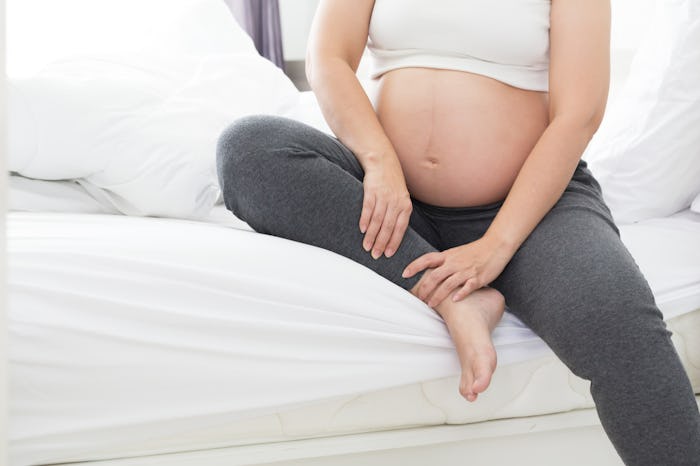Life

How To Prevent Leg Cramps During Pregnancy, & Avoid The Nightly Thrashing
As if the last trimester didn't contain enough discomfort, many women have to suffer through painful leg cramps in the last stretch of pregnancy. Unfortunately for those of us already heaving ourselves around the bed like beached whales, the pain often strikes at night when we could most use those last weeks to rest up for the incoming baby who will soon deprive us of restful sleep, so knowing how to prevent leg cramps during pregnancy is imperative. And just remember — it's a mother's prerogative to remind their children of all the indignities they suffered to bring their offspring into the world, so tuck this little nugget away for the mouthy teenage years.
Often attributed to the weight gain that reaches its height at the end of a pregnancy, doctors aren't exactly sure why pregnant women are especially prone to leg cramps, according to the Mayo Clinic. However, it makes sense that those extra pounds — and of course, the little human camped out in your uterus — contribute to changes in circulation, as well as pressure on the nerves and tendons that connect to your legs. It's usually a temporary discomfort that will ease after delivery when your pelvis is relieved of those 5 to 10 pounds of baby.
Signaled by sudden sharp pain and a tight calf muscle, leg cramps can be very uncomfortable and it often feels like an eternity passes until it's over. Toe stretches, where you flex your foot upward, are a go-to for quick relief, as is gentle massage, noted American Pregnancy Association. Also, hefting yourself out of bed for a wall stretch could be the emergency measure that brings relief, according to Fit Pregnancy.
Another theory Dr. Christine Greves, an OB-GYN at Winnie Palmer Hospital in Orlando Florida, tells Romper is that acid might build up in a pregnant woman's body, which basically means that spontaneous, debilitating leg pain is inevitable. "The information that I have is that there’s build up of lactic and pyruvic acid and it can lead to this involuntary contraction of the muscles," she says. "But it's just a theory."
Applying a hot or cold compress — different temperatures work for different people, Greves says — can also take the sting out of stubborn cramps that resist stretches and massage.
There are several preventative measures moms-to-be can take to keep muscles relaxed and limber, which is especially important in late pregnancy when they need to rest up for their little one's arrival. First, Greves likes to start with a few interventions that are relatively easy on mom, like regular exercise and daily stretching. Properly fitting shoes, which seems like a no-brainer until the day your feet swell and start resembling canoe paddles, can ease muscle tension in lower legs, she continues, and lots of water can prevent acid build-up.
Should those simple measures not work, Greves says that some of her patients have had success with magnesium supplements. It's an assertion backed up by a study performed by Bangkok's Chulalongkorn University, since the electrolyte plays an important role in muscle contraction and boosting your body's supply could assist it in correcting cramps.
Greves points out that pregnant women should always mention leg cramps to their doctor, just to rule out the possibility they aren't a symptom of something more serious. "It might not just be a leg cramp. You have to make sure it’s not a blood clot too," she says. "If you have one leg that is hurting you need to make sure your doctor knows, but they usually present very differently from the leg cramps."
Like most discomforts associated with pregnancy, cramping should subside after delivery and all systems resume their normal function. Until then, a gallon of water and a yoga mat could go a long way toward easing this one painful problem.